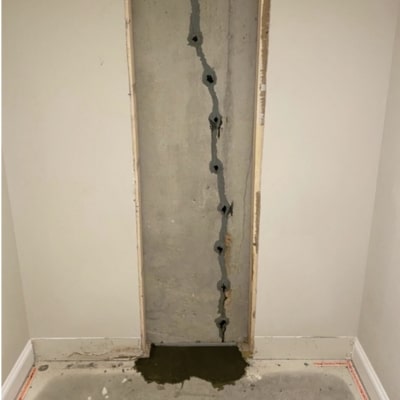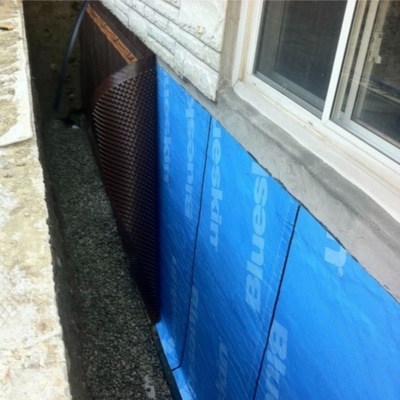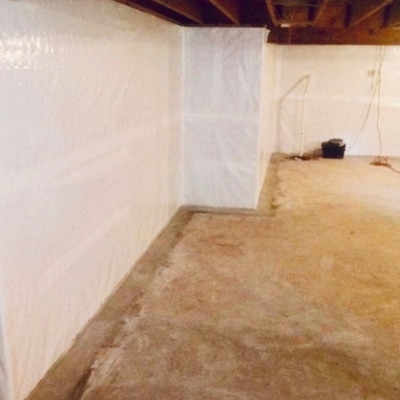Damp Basement
Damp basements may indicate more serious underlying foundation issues. Ignoring such concerns could lead to significant and expensive problems down the line.

Damp Basement Solutions in Northern Virginia, Shenandoah Valley, North Central Virginia, and West Virginia
A damp basement is a common issue for homeowners and can indicate foundation problems. This is caused by moisture seeping through walls, floors, or ceilings.
Identifying signs of a damp basement is essential to prevent further damage to the foundation and home. If left untreated, it can cause health issues due to mold growth and structural damage.
Contact LUX Foundation Solutions to learn more. We proudly serve Northern Virginia, Shenandoah Valley, North Central Virginia, West Virginia, and the surrounding areas in Virginia.
Do These Signs of Damp Basement Seem Familiar?
The symptoms
Do you notice water stains, mold, musty odors, or peeling paint in your finished living space? These could be symptoms of a damp basement caused by foundation issues. Other common signs to watch out for:
- A musty or damp odor
- Water staining or discoloration on walls or floors
- Cracks in walls or floors
- Efflorescence (white, powdery substance on walls)
- Mold or mildew growth
- Increased insect and pest activity
If you’ve noticed any of these signs, it’s important to address the issue promptly to avoid costly repairs down the line.

Musty odor
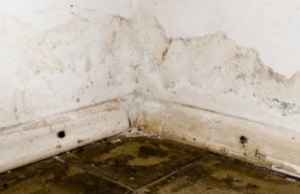
Water stain on walls or floors

Cracks near window
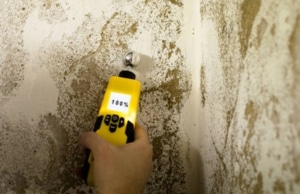
Efflorescence
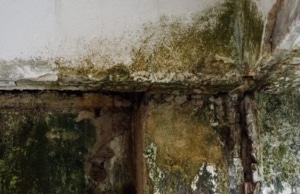
Mold or mildew growth

Increased insect and pest activity
What Causes Damp Basement?
If your basement is consistently damp, it is essential to identify the root cause of the problem. Common causes of damp basements include:
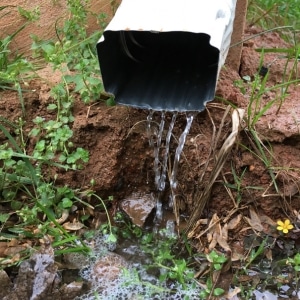
Poor Drainage
Inadequate surface drainage or improper grading around your home can create a situation where rainwater flows toward the foundation instead of away from it. As a result, water accumulates around the house’s base and can gradually seep through cracks or porous areas, causing dampness.
To mitigate this, ensure the ground slopes away from your foundation and install effective drainage systems like French drains or downspout extensions.
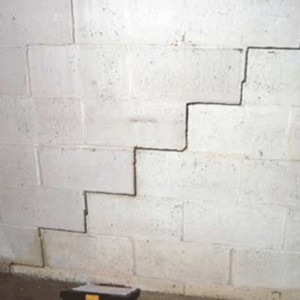
Foundation cracks
Cracks in your foundation walls or floor can be a direct entry point for water to infiltrate your basemen. These cracks can form due to various factors, including settling, soil movement, or structural issues.
Moisture from the surrounding soil can seep through these openings and lead to basement dampness. Addressing cracks promptly through repairs and waterproofing is essential to prevent further water intrusion.
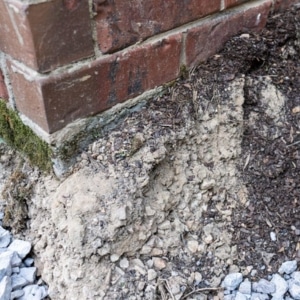
Improper slope
If the grading around your home slopes inward toward the foundation, rainwater can pool near the house rather than being directed away.
Correcting the slope by regrading the soil or adding swales and berms can help prevent water from infiltrating the finished living space. Proper landscaping and grading adjustments can redirect surface water away.
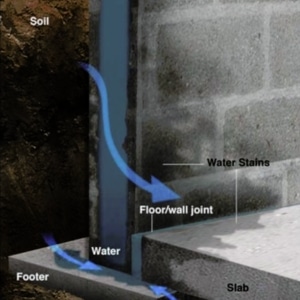
High water table
A high water table means that the level of groundwater is close to the surface of the soil. During rainy periods, this can result in hydrostatic pressure against the foundation walls, pushing water into the basement through cracks and porous concrete.
Installing a sump pump with drainage systems can help manage high water tables by collecting and redirecting water away from the finished living space.

Plumbing issues
Leaking pipes or faulty drainage systems within or near the foundation can introduce water into the basement. This can occur gradually or suddenly, depending on the severity of the plumbing issue. Regular plumbing inspections, maintenance, and immediate repairs are essential to prevent water damage.
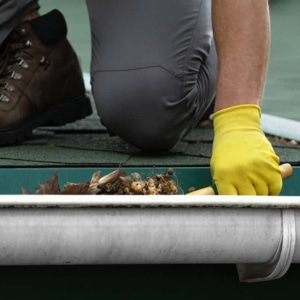
Faulty Gutters
Gutters and downspouts are essential for diverting rainwater away from the foundation. When gutters become clogged with leaves or debris or if they are improperly installed or damaged, water can overflow and saturate the soil. This excess water can lead to water infiltration and a damp basement that will cause structural damage.
Regular gutter cleaning and maintenance and ensuring proper downspout extensions can help prevent this issue.
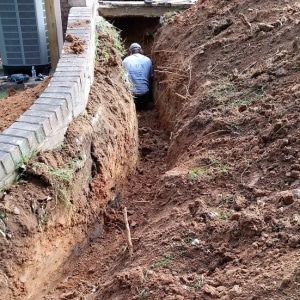
Soil Type
The type of soil surrounding your home’s foundation can play a vital role in the amount of moisture present. Clay soils, for example, have characteristics that tend to retain moisture. In contrast, sandy soils drain more quickly. If your property has clayey soil, it can become saturated during heavy rains, leading to increased pressure against the foundation and potential basement dampness.
Understanding your soil type allows you to implement appropriate drainage solutions, such as installing French drains or using moisture-absorbing landscaping materials, to help mitigate moisture-related basement issues.
Don’t let a damp basement go unchecked — contact LUX Foundation Solutions for a free estimate. Our team of experts will identify the cause of your wet basement and provide a comprehensive solution to ensure your home’s foundation remains strong and sound.
Our Solutions
To mitigate water coming in between the floor and wall, making your basement damp, the first step is to contact a professional repair service like LUX Foundation Solutions to identify the cause of the issue. It can be due to foundation issues, leaks in basement walls or floors, or high humidity levels. Once identified, our team will take the necessary steps to fix the root cause.
There are two potential solutions: crack repairs and interior or exterior waterproofing. Crack repairs involve sealing cracks or holes in the walls or foundation that may allow water to seep in. This option is most effective when the cracks are small and easy to access.
On the other hand, if your basement is experiencing significant water damage, interior or exterior waterproofing may be necessary. This approach involves creating a barrier around the outside or inside perimeter of your basement that prevents moisture from seeping through the walls. Exterior waterproofing requires excavating the outside of your home’s foundation to install a waterproof membrane, while interior waterproofing involves installing a drainage system or a sump pump inside your basement walls to direct any water away from your home’s foundation.
Addressing any issues with dampness or water damage in your basement can not only protect your home’s foundation but also improve the overall safety and livability of your living space.
Contact LUX Foundation Solutions to Solve Your Damp Basement Problems
Don’t let dampness ruin your basement and foundation. It’s important to address these issues as soon as you notice them. When you see these signs, take the first step by calling the experts at LUX Foundation Solutions.
Our expert team will come and examine the problem and provide a free estimate of the repair costs. We will also provide expert recommendations and offer a customized solution to fix any foundation problems and ensure a dry and safe basement.
Contact us or fill out our online estimate request form to schedule a free, on-site estimate today. We serve foundation repair services in Northern Virginia, Shenandoah Valley, North Central Virginia, West Virginia, and nearby. Let us help you protect and preserve your home’s structural integrity.
Request a free Estimate
FAQ's
If your home’s basement walls and floors are damp, it can cause serious damage to the foundation. Water can seep into the walls and lead to mold and mildew growth, which can weaken the structure over time. This can lead to cracks, shifting, and settling the foundation, causing major issues for your home.
Dampness can also escalate the risk of moisture damage, causing wood structural elements to weaken, mold and mildew growth, and metal components to rust. The damage can be to electrical wiring and other components. In the long run, this affects the value of your property and can lead to expensive repairs.
If you suspect that your home’s foundation has been impacted by dampness, it’s crucial to seek expert assistance immediately from a foundation repair service. An experienced contractor can uncover the underlying problems and provide long-term solutions to avoid future problems. It is essential to periodically inspect your home for signs of dampness to prevent long-term issues and costs.
To ensure the longevity and safety of your foundation, it is crucial to take preventative measures against damp basement issues. This includes regular inspections to identify any underlying problems. It is also essential to maintain proper drainage and avoid landscaping that could negatively affect the soil around your foundation.
Additionally, investing in quality waterproofing products and keeping your finished living space well-ventilated can go a long way in preventing moisture buildup. By closely monitoring and taking proactive steps to avoid dampness, you can safeguard your home from potential damage and ensure its long-term stability.
Yes, even minor dampness in the basement can lead to a significant foundation problem over time if left unaddressed. Moisture can weaken and cause structural damage if not properly managed. The dampness can also attract termites and molds, causing further damage to the foundation. Therefore, it is essential to seek assistance from an expert to identify the main reason and underlying problems and to take necessary measures to prevent any further damage.
Yes, it’s possible for a relatively new foundation to have a damp basement. In fact, there are several reasons why this might occur. One possibility is that the foundation was not installed properly, which can lead to water seeping in. Factors such as poor ventilation, inadequate sealing, high humidity levels, poor drainage, or leaky pipes can also cause water accumulation in the finished living space.
It’s essential to contact a reputable foundation repair service to identify the root cause of the issue and address it promptly to prevent further damage. Ultimately, regular maintenance and inspection can help avoid potential problems.

